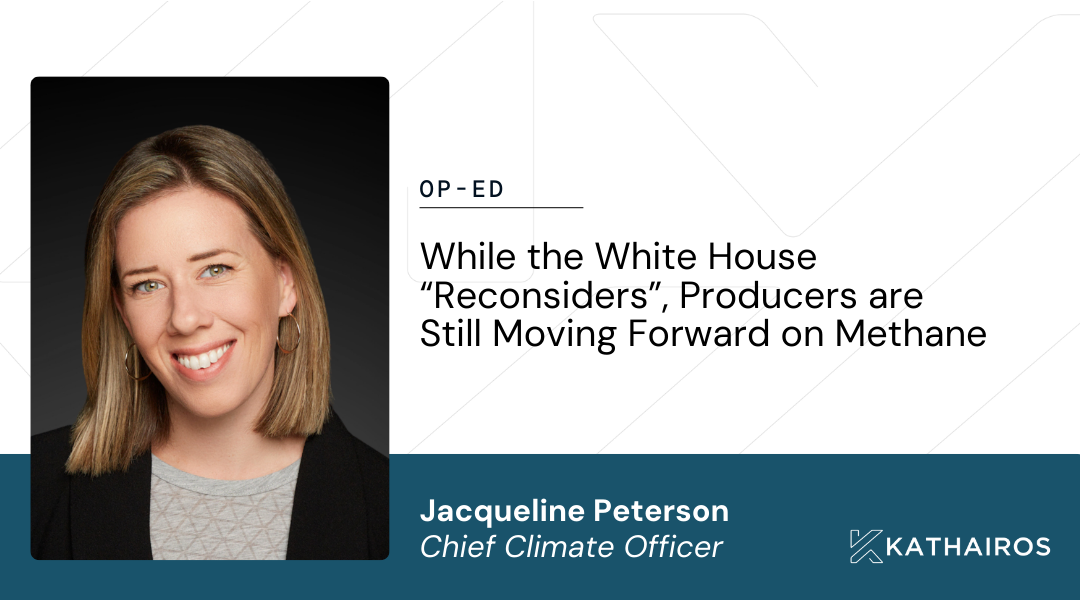
Kathairos has emerged as the leading North American solution for methane elimination from pneumatics, with more than 1,000 systems in operation across North America and over 40 major oil and gas producer partners.
In this post
The United Nations-appointed Intergovernmental Panel on Climate Change has made it clear: the clock is ticking, and the time to confront climate change is now.
Some countries are ahead of others when it comes to creating comprehensive programs addressing climate, according to a UN report.
Climate work done by 60 countries and the EU was analysed in the 2022 Climate Change Performance Index released following COP26 in November 2021. The report, jointly developed by Germanwatch, NewClimate Institute and the Climate Action Network, highlights the nations leading in the categories of emissions reduction, renewable energy use, energy efficiency and climate policy.
The metrics? Performance was judged and scored on the basis of a nation’s energy consumption, its national emission targets and the creation and attainment of policy goals. While the report’s authors have expressed “hope for change”, they critically left the first three positions of each category empty.
Why?
No country has performed well enough to earn a high ranking.
… Some nations, however, are making strides. The following are the 10 countries that rank highest in the climate change policy category, according to the index:
10: CHINA
Climate Policy Score: 15.68
Despite a lower overall performance rating, China has put forth a comprehensive approach to combating climate change and other environmental issues, like air quality, that have plagued the nation. President Xi Jinping has pledged to significantly increase the use of solar and wind energy by 2030.
9: SWEDEN
Climate Policy Score: 15.72
Sweden has led the charge for serious climate change policy on an international scale for the last few years, and is a major source of funding for the Green Climate Fund, the world’s largest climate fund and a critical component of the Paris Climate Accords.
8: FINLAND
Climate Policy Score: 15.98
As the first country to put a carbon tax in place, Finland has always been at the forefront of climate change policy. Its leaders recently strengthened the country’s commitment to green living by shifting to wood-based materials for its construction- and even textile- needs.
7: FRANCE
Climate Policy Score: 16.06
In the last year alone, France passed a climate change bill with the intent of taking a broad approach to environmentally-unfriendly practices. The proposed legislation included eliminating short domestic flights and limiting the use of plastic packaging.
6: PORTUGAL
Climate Policy Score: 16.27
Portugal is particularly vulnerable to droughts and floods owing to its geography, making combating climate change an essential part of the national strategy. The nation has made significant strides in renewable energy, constructing solar and wind plants that now account for over half of the energy generated for the country.
5: LITHUANIA
Climate Policy Score: 16.48
Like its fellow EU member states, Lithuania has implemented a 10-year National Energy and Climate Plan, which launched late in 2021. The plan focuses on transportation electrification, both for personal vehicle use and railway use, along with fuel consumption reduction by 24%.
4: NETHERLANDS
Climate Policy Score: 16.53
Beyond reducing CO2 emissions in line with EU standards, the Netherlands has worked hard to become an overwhelmingly bike and pedestrian-friendly nation. As sea levels rise, the country has also devised climate-adaptive schemes, such as intentional flooding, to safeguard its cities.
3: MOROCCO
Climate Policy Score: 17.23
The coastal nation of Morocco is particularly threatened by rising sea levels and other climate-related challenges. As a result, they have begun to shift from standard energy sources to renewables over the course of the last few years, targeting 52% renewable energy use countrywide by 2030.
2: DENMARK
Climate Policy Score: 17.87
In 2019, Denmark announced a 10-year plan to reduce carbon emissions to 70% below 1990 levels, which is one of the most ambitious programs announced in Europe. By 2050, the country aims to be carbon neutral, meaning that its emissions and absorption of CO2 would be zero.
1: LUXEMBOURG
Climate Policy Score: 18.11
Luxembourg’s most recent major piece of climate action legislation, the COVID-19 Recovery and Resilience Strategy, apportions 30.5 million euros toward increasing the number of charging stations in the country to support and ease transportation electrification.
Explore more posts from Kathairos
.jpg)
Decarb Digest, Issue 01: Discover Why Energy Leaders Aren’t Waiting on Washington

Op-Ed: While the White House “reconsiders”, producers are still moving forward on methane

